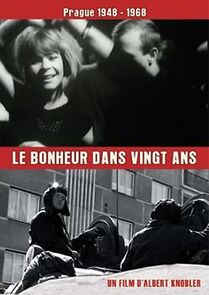|
Albert Knobler’s film retraces with archive documents the history of Czechoslovakia from the entry of Soviet troops, acclaimed by all the population, until the arrival of Soviet tanks in Prague under the boos of a crowd taken aback and terrorized. From Prague to Prague Spring. The film’s title is borrowed from the ironic signs of this Prague spring: “1848: Happiness in 20 years”, “1948: Happiness in 20 years”, “2048: Happiness in 20 years”. The film’s release in 1971 was very controversial: even if Pierre Daix in “Lettres Françaises”, Jean Daniel in “Nouvel Observateur” and Raymond Aron in “LeFigaro” underlined the strength and beauty of this film, the whole of the press and in particular “the World” condemned the film of “primary anticommunism”. “Happiness in twenty years” was a failure. Depressed, misunderstood, the director committed suicide. The film was forgotten, the negative lost. Miraculously in 2001, Françoise London, the daughter of Arthur and Lise London found a copy. She also found the mix of the English version, commented by Orson Welles. To trace this twenty years, the director, who was Frédéric Rossif’s assistant for Dying in Madrid, freely examined 200,000 meters of news tapes and propaganda films during the spring of 1968. He reported to Paris 25,000 meters to edit the film. For his part, Kostas Papaioannou, professor at the Ecole Pratique des Hautes Études, gathered the sound elements from which the texts and comments said by Michel Bouquet are taken. |
||
| Ratings: | IMDB: 0.0/10 | |
| Released: | January 1, 1971 | |
| Runtime: | 89 min | |
| Genres: | Documentary | |
| Countries: | France | |
| Companies: | Antégor | |
| Cast: | Michel Bouquet | |
| Crew: | Kostis Papaioannou Albert Knobler | |



allswright : It' s excellent. Even though it's another country and culture, the period is the one I gre...